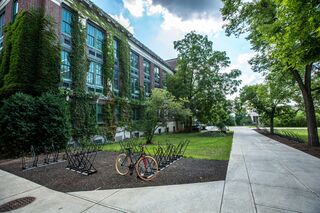Friends
The Freshman Do-Over
Five strategies for students heading back to campus.
Posted June 7, 2021 Reviewed by Kaja Perina
Key points
- Hard-hit by the pandemic, college students will be heading back to campus amidst some challenges.
- Rising sophomores face particular challenges, since this will be another type of freshman year.
- Here are some ways that students can use this past year to their advantage while creating a new experience this year.
As a college professor for 26 years, I’m finding myself reflecting on what the last year has taught my students and me and anticipating what the new academic year might be like. It has also gotten me thinking about one group of students in particular—rising sophomores.

For the hundreds of thousands of rising sophomores across the country, they had a freshman experience like no other. Rising sophomores will likely fall into about four groups: students who lived on campus this past year but had an experience that likely masked the real thing; students who took a gap year; students who lived at home with parents and any siblings and did their classes virtually; and students who lived somewhere else entirely—either with friends or alone, near campus or not at all—yet took classes online, either at the school to which they had been admitted or somewhere else that felt more accessible.
These groups of students are likely more hopeful and more skeptical, all for a good reason. How might they draw on lessons learned this past year while simultaneously making themselves anew? What might benefit them and help ensure the most meaningful and productive back-to-school experience possible? Here are ideas that might help and that could also be used by anyone heading back to campus in the fall:
A beginner’s mind is often the best mindset.
What is a beginner’s mind? It is the ability to see with fresh eyes, to see what is common and familiar in a whole new way. It requires openness and curiosity, two qualities that benefit all of us in higher education. Those who are beginners in anything bring with them more of a sense of a blank slate, a fresh canvas, and a way of seeing that is just insider and outsider enough simultaneously to be rooted flexibly. Cultivating a beginner’s mind means letting the preconceived notions and judgments fall away, and it is an openness to what is.
College sophomores remind us of this; they were faced with some choiceless decisions last year. Those who still succeeded and flourished did so because of the resilience borne from knowing what expectations they had to let go of and what experiences they could try to remake as their own.
This is really true of anyone in the pandemic or in any time of individual or collective crisis. Even if at first there is some accompanying grief and anger to process, those who accept the limitations they are given, rather than railing against them, are better positioned for growth. Reflect on what really matters. Ripe with possibility, this mindset presents us with the opportunity to recreate ourselves every day.
Focus on the present.
The sophomore year offers a prime opportunity to enjoy present moment awareness. I learned this during my own sophomore year. You’re not that new, yet it’s still fresh. You’ve acclimated to some aspects and have so much more to discover and learn.
Half your friends aren’t scattered across the globe for study abroad, as is so often the case in junior year. And you’re not in the middle of graduate school applications, job interviews, and, best of all, no one yet is asking you nonstop questions about what you’re going to do when you graduate. Sophomore year is the time to solidify and deepen friendships that began freshmen year and to let go of the ones that did not serve you as well, to move out beyond the ready-made social circle of roommates and dorm friends, and to chart your own course.
You’re not alone.
Even if you feel like you did not meet anyone new last year, you’re not alone. So many students will be approaching the new academic year feeling the same way. Even if you’ve accumulated academic credit yet feel like your social and personal life was on a long pause, there’s time to catch up. The friends you make in college will likely carry you and be buoys all your life. You’re not in as much of a rush as you might think.
Seek out conversations with professors, coaches, and others who might become potential lifelong mentors. They may help you connect with like-minded people on and off-campus. Students frequently share with me intimate details of their lives, and I’m constantly connecting them to other people who have been through something similar. This is true for students who have lost siblings, those struggling with various forms of self-injury, students who are faced with a new diagnosis of any kind, etc. In fact, students have disclosed to me about contracting STDs, and they told me they felt dirty, disgusting, and unlovable, but when people are able to connect with a sense of mutual understanding and compassion about hard issues, that can be a beautiful thing.
Plan ahead for promises and pitfalls.
Before school resumes, take time to sit with yourself and think, perhaps with music in the background, and better yet, with a journal in hand or at least a piece of paper and pen. Make a dream list of how you want your new unfolding year to look and the steps you plan to take to make that possible.
Think about your strengths and talents and the people, places, and resources you can seek out on campus or in the larger community to maximize these. How will you follow your passions? If you adore running, buy a book and explore all the amazing running trails and races that are happening in your new home area. If you’ve always wanted to take a pottery class, look into art classes that are offered as well as studios in the community to which you are moving.
Or maybe there is a social issue you care deeply about, like mental health, the LGBTQ+ community, systemic racism, or violence against women. Go online to learn about the various local organizations and coalitions that exist for which you might volunteer, intern, or even seek eventual employment. These are some ways to begin to bloom where you are planting yourself and to connect with the community you’re finally getting to inhabit.
Conversely, think about what you struggle with and start thinking about how you might go about preventing problems from festering. For example, do you know you have trouble with math or a language, yet it’s a requirement to take that class? Try to get information about the student success center and tutoring resources on your campus.
Or, do you know you have issues with anxiety and/or depression? Do you have a plan in place to continue to work with a therapist you’ve been seeing, or have you considered looking into the counseling services offered at school or in the surrounding community? Think now about how you would seek help, so you’re not trying to find it when you are floundering.
Consider the mind/body connection.
Self-care is essential for all of us. College provides a great opportunity to practice this, as it is typically the first time students have lived away from home for such an extended period. Taking the time to devote to exercise, proper nutrition, sleep, meditative moments, the outdoors, time with friends, time alone, and greatly minimizing alcohol and drug consumption that can induce problematic lifelong habits all will go a long way to building a healthy experience.
And last but certainly not least, getting fully vaccinated will be essential to getting to fully enjoy the rich array of opportunities on campus and the intimacy that can result from these. Getting vaccinated is a way to live out some of the most important lessons of the college experience—to value scientific data and the production of knowledge; to become a citizen who contributes to the good of your community; and to think about the world beyond yourselves.




